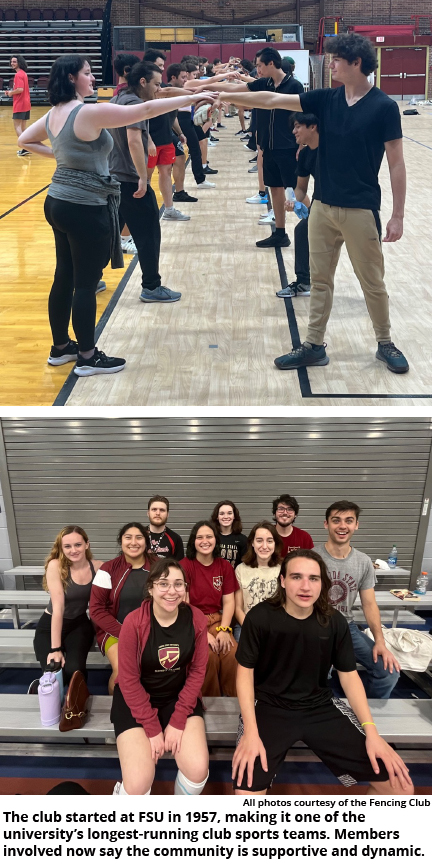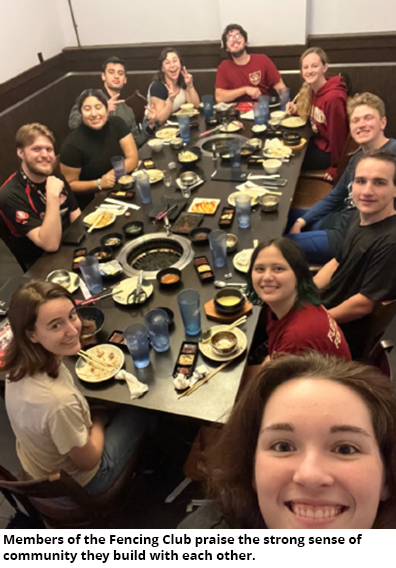English majors in the FSU Fencing Club strive to strengthen the organization through more inclusivity and a focus on community
By Emily Wilmot
Four of the eight members on Florida State University’s Fencing Club officers' board are English-Editing, Writing, and Media majors. Seems like an odd ratio for a club not meant for a specific major or career path.
How did this happen?
“I got my first dose of [the sport] in high school,” says club Vice President Reilly Maresca, who in addition to English-EWM is majoring in history and in emergency management. “I was a junior and we got stuck in homeroom all day, and that so happened to be with the English teacher who ran the fencing club.”
The teacher allowed students to practice in class with swords and other gear, which Maresca enjoyed doing.
“At the start of [college] sophomore year, I sought out fencing,” he adds.
Kaylee Holmes, who is a major in both English-EWM and in studio art, found her way to the club through Noelle Day, who is the club’s president and majoring in English-EWM and linguistics.
“I was just aimlessly walking around the booths when I met Noelle,” says Holmes, who is the club’s secretary. “I found out we were the same major and so I stuck with her. She mentioned she used to do fencing, so we found their booth and I signed us both up. It felt really random, but I just wanted to meet people and we already had something in common, so why not do fencing together.”
The club started at FSU in 1957, making it one of the university’s longest-running club sports teams. The four English majors who are involved with the club as officers describe the group as a supportive and dynamic community, and they are focused on making their club a welcoming place for new members.
The officers’ aim is to increase inclusivity and to ensure the organization is easy to join. In addition to the people they have met, other benefits come from the work they put into learning the sport.
“It keeps me active,” Day says. “I have a hard time exercising if I’m not learning something, I need that incentive. It’s been good for learning how to be more competitive and managing feelings about wins and losses.
“Also, it’s good to calm down because you get to hit people with swords.”
Along with getting one’s blood pumping, being threatened by a sharp object could teach lessons to apply to everyday life.
“It helps you stay calm under pressure a lot, because in the middle of a fencing bout, you have to be able to make quick decisions when there is quite literally someone thrusting a sword at you,” says Rachel Olson, who is the club’s assistant armorer and a double major in English-EWM and classical civilizations. “I feel that some of that can be translated to general life problems.”
Maresca adds that he has changed as a person by learning from the fencing coaches he has met in the club, “some of the best teachers I’ve ever had.”
“It’s a learning process that’s a lot different than what one can expect in a classroom, and it’s more at your own pace,” he says “I learned a lot about my own development, and I think I’ve matured a lot having to confront this thing I wasn’t very good at. I wanted to do it, and resolved myself to get better at fencing, to the point where now I’m decent at it.”
Along with learning on the piste, these officers are learning in the English classroom. The English major itself, they say, is a tight-knit group, where people know each other through a variety of connections.
“English, especially EWM, is a major that fosters a really strong sense of community,” Olson says. “I feel like I know most of the other EWM majors and so when you are befriending these people, it’s a lot easier to say, ‘hey, come check out this club.’”
 Day says what she learns as an EWM student makes her a stronger president.
Day says what she learns as an EWM student makes her a stronger president.
“I think it’s communication. Being able to communicate well is so important because my job is talking to sports clubs and people to get venues,” she says, explaining the process to coordinate tournaments with clubs from other universities. “Another club is more likely to drive two to four hours to come to Tallahassee, usually at 8 a.m., if you communicate well.”
Holmes draws on her studio art major for inspiration in her position as club secretary, which she did not know existed before joining, along with a want to make a difference within the club.
“I knew I wanted to be a bigger part of the fencing community, because I really enjoy knowing so many of the people that [hold bigger roles],” she says. “I remade the club’s logo, and I made patches for the team because that’s a huge part of fencing culture.”
Peer support is an influencing factor for Olson, along with wanting to learn more about the armorer job.
“Jonah, the head armorer, is a close friend of mine, and so it was a lot of community support,” Olson says. “When I started showing interest [in the role], he said that I should run. The mechanical side of it is very interesting as well. I like having the knowledge of how the weaponry in the gear works.”
The community itself and Maresca’s desire to help strengthen the club prompted his decision to take a leadership role.
“It was a desire to help foment the community that I love so much and ensure that I would be around for prosperity,” he says. “I had a lot of good experiences with officers when I first joined, and I really respected the role they had in setting club culture.”
The board’s goal for change has manifested into a campaign to make the club an inclusive place, which has created a welcoming atmosphere for people with all skill levels and interests.
“I don’t want the club to be inaccessible—we want people to join,” Day says. “I’m not the most athletic person, but it’s fun to learn. I want to make sure that it is really open for people to go in for fun and have a good time, and then also make space for people who are serious to be super competitive.”
The sport has a history of excluding women, with the Olympics introducing women’s épeé only in 1996 and women’s sabre in 2004. At FSU, though, the situation has been different over the years, but making this space even more available to women is a goal for Day and the other officers.
“There’s so much misogyny in this sport, but historically FSU has had a lot of women presidents for the fencing club,” Day says.
Olson talks more in depth about increasing inclusivity for women and nonbinary individuals.
“Fencing is a sport that doesn’t really favor a given gender, and while that’s good for everyone, I feel like it’s particularly exciting for women and nonbinary people who may otherwise fear they’d struggle in a sport as physical as fencing,” she says. “The coed nature of competitions can be scary at first glance, but I’ve found them to be very fun, and the idea that you truly can go against anyone and win if you hone technical skill enough is compelling.”
The gear can play a big part in making this space more accessible for women.
“Women in fencing have to wear chest guards as a piece of heart protection; the sizes of club gear that we have are not conducive to everybody,” Olson says. “A good goal is to have a better range of sizes, making sure everyone has what they need and that our tournaments run smoothly.”
To accomplish the goal for increased inclusivity, officers are working on more funding for the club.
“We want to get a stronger grip on fundraising, and we would like to put the club out there more,” Holmes says. “A lot of what we do fundraise goes toward the general equipment shelf we have because we try and make it as student friendly as possible where you don't have to come with any experience or even any gear.”
Students who join the club are privy to the community and fun provided by tournaments and old traditions.
“I’ve had a lot of very good times at tournaments; my sort of personal development and how I understand myself through fencing tournaments are really good break points for that,” Maresca says. “I’m testing myself against a much vaster group of people than I typically do.”
Another club activity helps members get to know each other and to get a good laugh.
“Our fencing club has this tradition we do called noodling, where if you see another person out in public that's in the fencing club, you take a sneaky picture of them, put it into the Discord, and you ‘at’ them and ‘at’ the president, and then you get a noodle point,” Holmes explains. “Noodling is a long tradition.”
Olson describes what happens after the picture is taken.
“The aftermath of that is you have to go up and say hello, which fosters that sense of getting to know people, recognizing people out and about,” she says.
The friendships and bonds created from those little moments builds into more.
“I think my favorite part of the club is how strong of a community feel it has,” Olson continues. “I’ve met many of my closest friends, or at least became a lot closer to them through fencing.”
The fencing club provides members with a special sense of camaraderie, where they feel supported and cared for.
“I’ve had a lot of bad experiences with student organizations,” Maresca says, “and to have such a genuinely wonderful community has done me a lot of good. The people I’ve met have changed me a lot for the better.”
Current members hope students join the fencing club to share their affinity for the people and sport.
“You can be anyone and still come to the fencing club and be successful,” Holmes says.
Maresca echoes the emphasis on the club’s inclusivity.
“I can absolutely recommend that students should come try it out. There’s virtually no barrier to entry,” he says. “We have some more hardcore athletic, competitive types, but there’s definitely a community there for that fencer type, where you’re reading literature about swords, or you’re into Dungeons and Dragons. We have that community.”
At the end of the day, English major or not, fencing has become a home for these and many other members. There is a welcoming environment that fosters friendship and support in a unique manner. Beyond these four officers, the fencing club will continue to grow and expand as others come to realize those qualities.
If you would like more information, follow the club on Instagram, @fencing_fsu.
Emily Wilmot is an English-Editing, Writing, and Media major, with a minor in economics.
Follow the English department on Instagram; on Facebook; and on X.
